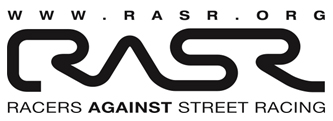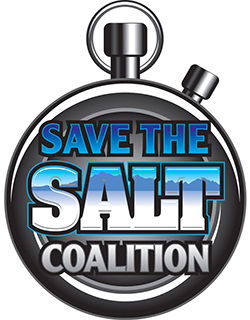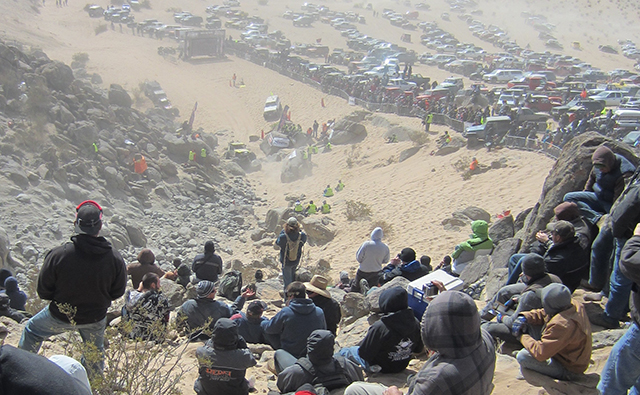 SEMA's roots are firmly planted in the racing sector. When formed in 1963, the "Speed Equipment Manufacturers Association" represented companies producing performance equipment for many of the early trailblazers that set land-speed records at the Bonneville Salt Flats or other dry lakes and racing venues. Now, more than 50 years later, the industry has blossomed and the renamed "Specialty Equipment Market Association" embraces the entire distribution chain, including manufacturers, warehouse distributors, jobbers, retailers, specialty stores, sales agents and media companies.
SEMA's roots are firmly planted in the racing sector. When formed in 1963, the "Speed Equipment Manufacturers Association" represented companies producing performance equipment for many of the early trailblazers that set land-speed records at the Bonneville Salt Flats or other dry lakes and racing venues. Now, more than 50 years later, the industry has blossomed and the renamed "Specialty Equipment Market Association" embraces the entire distribution chain, including manufacturers, warehouse distributors, jobbers, retailers, specialty stores, sales agents and media companies.
Speed equipment remains the brick and mortar of SEMA. In fact, Bonneville and other dry lakes played a crucial role in SEMA's formation since they were primary venues for industry pioneers to race their cars in the 1930s and 40s. These pioneers would adjust their equipment on the salt flats or lake beds and then go back to the garage to create the next generation of speed equipment. Many started companies and founded the sport of drag racing. In turn, these companies understood the importance of having an industry trade association and created SEMA.
In more recent times, founding SEMA members like Ansen, B&M, Crager, Edelbrock, Grant Industries, Halibrand, Hedman, ISKY Racing Cams, JE Pistons, Mooneyes, Shelby, Trans-Dapt and Weiand have been joined by scores of other companies that produce high performance parts. Meanwhile, SEMA's special ties to Bonneville remain. Where else but Bonneville does one test the limits of that equipment? Whether it is a 1932 hot rod, a 1960s muscle car, a streamliner or anything in-between, Bonneville is the proving ground for SEMA member companies and their customers.
Legislative and regulatory advocacy has been a key factor in helping SEMA member companies succeed and prosper. In the 1950s, the industry operated largely free of regulatory constraints. Following the introduction of California regulations in the '60s to curb mobile-source air pollution, federal and state governments proposed a variety of restrictive measures. Without SEMA's advocacy efforts, the laws and regulations that came to control our industry could have been overly restrictive with unnecessarily detrimental effects on businesses and consumers.
Although the current legislative/regulatory arena places a focus of attention on street vehicles, SEMA and its Government Affairs staff continue to advocate on racing issues. To follow are recent examples:
Off-Street Racing
 |
Racers Against Street Racing (RASR): SEMA re-launched RASR to promote safe and legal alternatives to illegal street racing. The webpage is part of the SAN website and provides resources to help enthusiasts take their racing activities to the track. SEMA has partnered with the National Speedway Directory in order to identify racing venues. |
Off-Highway Racing
 |
 |
|
Bonneville Salt Flats: SEMA is a partner in the "Save the Salt Coalition," which fosters and supports a comprehensive salt replenishment campaign by the racing community, BLM and mine operator. |
Johnson Valley, CA: SEMA is working with the Off-Road Business Association (ORBA) and a number of other organizations to protect the Johnson Valley OHV recreation area, home of the King of the Hammers event. SEMA advocates continued control of the land by the BLM and issuance of special-use permits to the U.S. Marines to conduct one or two months of training exercises on the land, which is adjacent to the Twentynine Palms Marine base. |
State Legislation
-
Noise Laws: SEMA continues to advocate for reasonable application of noise laws before lawmakers and regulators. In many instances, a long-established facility becomes the target of noise restrictions when new housing developments are constructed nearby.
Federal Legislation
-
Depreciation: SEMA partnered with NASCAR to support efforts to include 7-year race track depreciation exemption amendment to "Fiscal Cliff" legislation. The amendment allows "motorsports entertainment complexes" to depreciate the cost of capital improvements over a shorter, seven year period than other facilities.
-
Sponsorships: SEMA worked with NASCAR to support and protect military sponsor-ships of race teams (U.S. Army, Air Force, National Guard). An amendment to a federal funding bill was introduced to eliminate military expenditures on these sponsorships and was defeated by a narrow vote. SEMA directly engaged members of the Congressional Automotive Performance and Motorsports Caucus to urge their support for sponsorships and votes against the amendment.
Federal Regulations
-
CAA Racing Exemption: SEMA continues to advocate for clear and practical application of the Clean Air Act's exemption for emissions-related equipment used solely for competition use.
Racing Fuel
-
Canada: In 2010, as requested by SEMA, Environment Canada issued a final rule to indefinitely extend an exemption allowing the use of leaded gasoline in competition motor vehicles.
-
U.S.: SEMA monitors for any attempt to modify the Clean Air Act exemption permitting leaded fuel for competition vehicles.
Land Use Policies & Off-Road Equipment
Many SEMA members market equipment that is used by off-road enthusiasts. Importantly, the same equipment is used to improve and individualize the performance of their vehicles. The enthusiasm for these products is dependent, in part, on the availability of public lands for off-road use.
Threats to off-highway vehicle (OHV) access typically take form in legislation passed by Congress or regulations issued by the U.S. Forest Service, U.S. Bureau of Land Management or other federal and state agencies. Roads and trails may be closed when lands are designated as "wilderness," unnecessarily large amounts of lands are closed to protect endangered species, or other restrictions are placed on federal and state lands.
SEMA supports land use decisions that are reasonable and enjoy local community support but opposes unnecessarily restrictive land-use policies. Since the federal laws and regulations that govern land use are complex, it is sometimes difficult to relate how "NO TRAILS" translates into "NO SALES" for SEMA members that cater to the off-road industry. The following is a guide to major laws that dictate land use, federal agencies that administer the laws, some of the organizations that SEMA works with to protect the rights of off-road enthusiasts to use their vehicles on public lands, and SEMA's positions on these issues.
